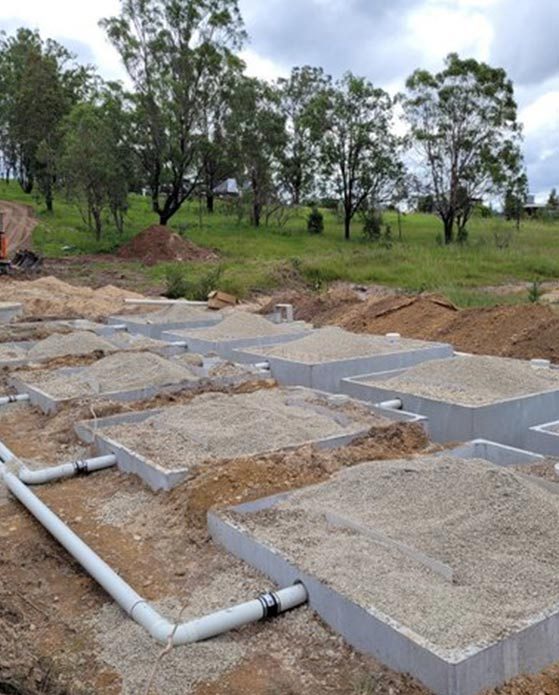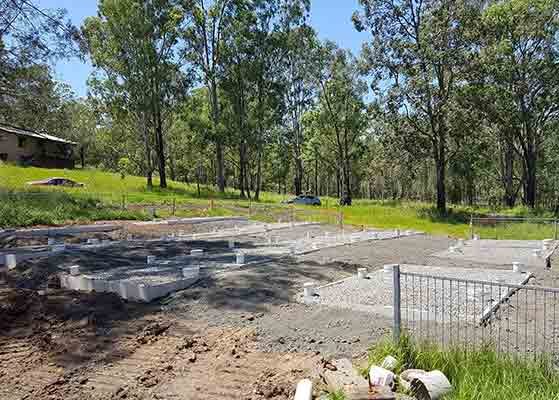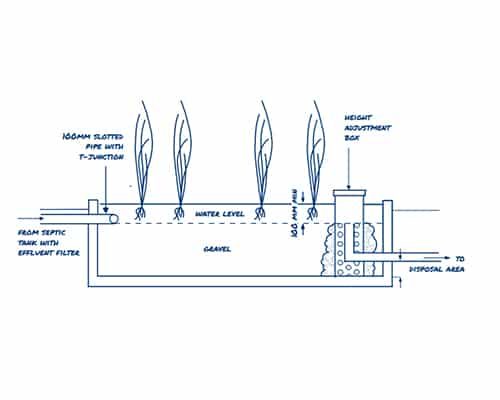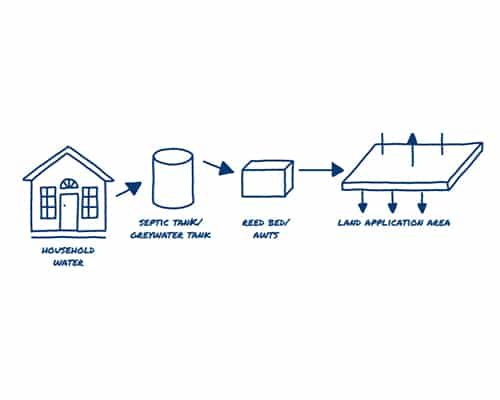

At Graham’s Precast Concrete Products in Kyogle, we manufacture and install quality reed beds for clients throughout the Northern Rivers region. Our delivery drivers can travel from Tweed heads, Lismore and Grafton to Yamba, Coffs Coast and Byron Bay.
A reed bed is a secondary treatment system used to remove excess pollutants from wastewater. It’s a natural, eco-friendly way to treat black and greywater after it passes through a septic tank.
A reed bed is basically a precast concrete container that is filled with 10-20mm gravel and specific plants called reeds. As wastewater travels into the reed bed, it is dispersed across the whole width of the bed. It is then spread through the gravel and the ‘reeds’ absorb the untreated water, and a range of natural reactions occur.
This process removes all unneeded/unhealthy microorganisms and bacteria from the wastewater. The water then can be used on the land, as it’s now safer to be put back into the environment.
Concrete reed beds are a long-term, eco-friendly wastewater solution. They remove extra unhealthy bacteria before the water is returned to the environment through trenches. But that’s not all!
There are many reasons to install a reed bed at your home, business, or rural property. You can save on power and upkeep costs, as the bed is fed by gravity, and you can maintain it yourself after installation. To learn more, contact our team!

One of the main benefits of concrete reed beds is their ability to remove excess pollutants from wastewater. The microorganisms present in the beds consume nutrients and pollutants present in the water, breaking them down and purifying it in the process. This ensures the water is safe to be returned to the environment and reduces the risk of pollution.
The cost of installing a concrete reed bed is significantly lower than traditional treatment methods such as septic tanks or sewage treatment plants. This is due to the simplicity of the design and construction of the reed bed. The precast concrete container that holds the bed is relatively inexpensive to produce and the bed itself does not require complex mechanical equipment to function.
Unlike traditional treatment methods that rely on mechanical processes and require significant energy input, reed beds are gravity-fed and rely on natural processes to treat the water. This results in a much lower energy consumption as there is no need for electricity to power the treatment process. This makes reed beds an ideal solution for remote or off-grid locations where access to electricity is limited or solar reliant.
Once installed, these systems do not require significant ongoing maintenance, making them a cost-effective solution for treating wastewater. The maintenance required for reed beds is minimal and can be easily performed by the property owner. This can include simple tasks such as monitoring the water level and removing any debris that may accumulate in the bed.
The natural treatment process that takes place in the reed beds is self-sustaining, which means the microorganisms and plants present in the bed will continue to purify the water even with minimal maintenance. These microorganisms and plants are naturally adapted to the environment and require no additional inputs to continue to function.
Regular monitoring and maintenance of the bed can ensure that it continues to function at optimal efficiency, but even in the case of neglect, the bed will not lose its efficiency completely.
In addition, the precast concrete container that holds the reed bed is durable and long-lasting.
The reed bed is designed to mimic the natural wetland environment, where plants and microorganisms work together. The plants in the reed bed provide a habitat for microorganisms, which in turn purify the water. This creates a symbiotic relationship between the plants and microorganisms, resulting in a natural, efficient and sustainable wastewater treatment process without the use of chemicals.
Concrete reed beds can also provide a habitat for a range of plants and animals that are commonly found in wetlands. The plants in the reed bed can provide food and shelter for a variety of insects, birds, frogs and small mammals. The microorganisms in the bed can also attract aquatic animals such as dragonflies, damselflies and amphibians.
Additionally, reed beds can also help to improve the local ecosystem by providing food and shelter for a variety of insects, birds, frogs and small mammals. The microorganisms in the bed can also attract insects such as dragonflies and damselflies, helping to support biodiversity and improve the overall health of the ecosystem.
Concrete reed beds can be designed to seamlessly blend in with the surrounding landscape, or to stand out as a unique and striking feature. They can be effectively integrated with other elements of the landscape such as water features, pathways or rock gardens to create an overall aesthetic appeal to the property. Additionally, reed beds can be incorporated into a property’s overall landscape design, resulting in a cohesive and visually pleasing outdoor environment.

Black water is the water that comes from your toilets and greywater is all other wastewater out of your house, that includes from your bathrooms (shower water), kitchen and laundry.
Concrete reed beds can be used in a variety of locations. They are most sought after for remote or off-grid locations where access to electricity is limited or expensive.
In Northern NSW, reed beds can be used for irrigation, as the treated water is safe to be returned to the environment. The reed bed treatment process removes any unhealthy microorganisms and bacteria from the wastewater, ensuring it is safe for irrigation. This can be an effective way to conserve water, as wastewater is recycled for irrigation purposes.
In NSW, it is important to comply with regulations surrounding the construction of concrete reed beds. To ensure proper function and compliance, it is recommended to consult with a professional for installation of the bed. Attempting to install a reed bed on your own may lead to inefficiency and failure to effectively treat wastewater, potentially contaminating your property with untreated pollutants.



Monday
Tuesday
Wednesday
Thursday
Friday
Saturday
Sunday
7:00am – 4:00pm
7:00am – 4:00pm
7:00am – 4:00pm
7:00am – 4:00pm
7:00am – 4:00pm
Closed
Closed